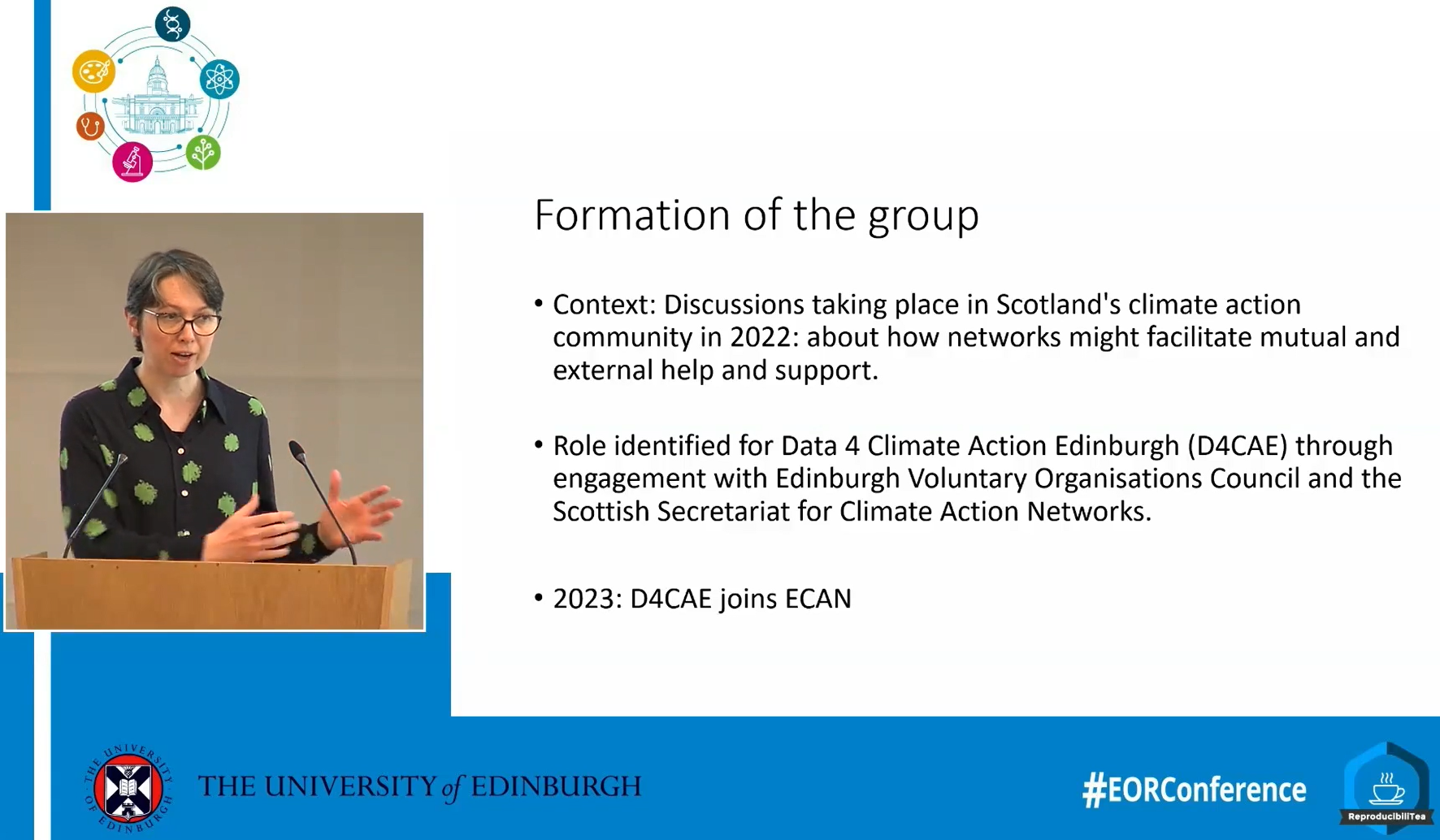Pauline Ward, 6 August 2023
I recently gave a presentation about the purpose, the evolution and the activities of Data 4 Climate Action Edinburgh at a conference. In this blogpost, I share the abstract, the slides, and a link to the video of the talk I gave on 16 May 2023. The event was the Edinburgh Open Research Conference, run by the wonderful Kerry Miller and Neil Coleman of the University of Edinburgh’s Library Research Support service. The conference theme was “Open Research as a Tool for Addressing Global Challenges”, very apt for our work. I recruited several new members through the event, who immediately started making a real contribution to our work, so I’m really thankful to have been invited to speak.

Lightning talk abstract: “Data 4 Climate Action Edinburgh”
Data 4 Climate Action Edinburgh is a group of volunteers, donating our time and skills with data to support climate action and biodiversity in and around Edinburgh.
The formation of the group was the idea of Pauline Ward, inspired on hearing discussions about how climate action groups could be supported, and how they could help each other, through regional networks. Discussions with the Edinburgh Voluntary Organisations Council and the Scottish Secretariat for Climate Action Networks identified a role for D4CAE as part of such a network in Edinburgh. The Scottish Government has been working on a programme of support for such regional networks, the first being North East Scotland Climate Action Network. Specifically, there appeared to be great potential in facilitating the making of connections between local climate groups and prospective volunteers from among the staff and students of the University of Edinburgh.
With practical support and dialogue with the University of Edinburgh Sustainability team and Community Engagement team, D4CAE carried out a survey of members of the public at the Edinburgh Climate Festival 2022. Underneath the University gazebo, individuals volunteered to help and talked with us about what areas of work would be most worthwhile in their view. The participants indicated their choices by placing chips into paper cups labelled with the options ‘mapping’, ‘sharing’ etc. The top result was ‘storytelling with data’. Volunteers asked us to create a mailing list so they could keep in touch and help. Climate activists told us they wanted help with presenting data about their activities for inclusion in funding bids, and mapping.
We now have a facebook page, website and a github repository. We use free tools from Google for email and file sharing (Drive, Sheets, Docs). We hold a monthly online drop-in on Zoom. We’re working on building links into the university, and working with data.
Biggest challenges – Many of our contacts who want to help are doing so in a professional capacity, and therefore mostly available during office hours, while the volunteer effort happens outside of working hours. Meanwhile, making the local groups aware of our offer is an area we need to work on, in partnership with the climate action network which is evolving and taking shape.
Looking ahead – Hoping to organise a datathon event near or at the university in the near future.
Delivering skills – We’re in the business of sharing skills, and building our own skills with data along the way. We have fielded requests for help with non-climate data, both from professional life science researchers looking for help with data visualisation, and others through the community engagement network. The experience suggests there may be potential for a platform and other work to build more links for voluntary organisations to find help with specialised skills among the staff and students of the university.
Conference materials
-
Presentation Video http://journals.ed.ac.uk/eor/article/view/8088/11864
-
Presentation Slides (PDF) journals.ed.ac.uk/eor/article/view/8088/11865
-
Information about the conference, including link to all the talks, and newsletter sign-up
www.ed.ac.uk/information-services/research-support/open-research/edinburgh-open-research-conference